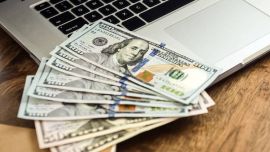Argentines are seeking more and more hedges against a possible devaluation of the nation’s currency amid delays and difficulties in the negotiations between the government and the IMF ahead of an upcoming presidential election.
Signs that Argentines are dollarizing multiplied this week. The peso reached a record high of 527 per dollar in the black market on Wednesday, from around 500 just 10 days ago. Estimates from private firms show the central bank increasingly intervening in the bond market to support the local currency.
“We are noticing a notable increase in the intervention of the public sector in the bond market,” said Pedro Siaba Serrate, a senior economist at Buenos Aires-based Portfolio Personal Inversiones. “We estimate that dollar sales to support bond prices and influence the price of the parallel exchange rate reached an almost two-month high.”
A delegation from Argentina’s Economy Ministry arrived in Washington DC this week to discuss the fifth review of the $44 billion International Monetary Fund program. Officials from the South American nation expect to close a staff-level agreement by Friday after months of negotiations, which have been further complicated by Economy Minister Sergio Massa’s presidential run. The government owes the Fund about $2.6 billion by the end of July or risks running into arrears.
The central bank’s reserves — at the lowest level since 2016 — are adding to investor angst before the upcoming elections. Argentina holds primaries on August 13 ahead of an October vote that will usher in a new government against a backdrop of economic woes that include triple-digit inflation and a historic drought that crippled agricultural exports.
The country’s official exchange rate, which differs wildly from the parallel rate, has lost 34% of its value against the dollar, making it the worst-performing currency among emerging markets. Many local economists project it will slump to 400 per dollar from the current 268 by the end of this year.
The rising pressure can also be felt in other types of hedging. The effective implicit rates of the futures exchange rate climbed to 433 for August, from 335 at the end of June, despite central bank interventions. Yields on dollar-linked securities maturing in 2024 are already at negative levels of between 6% and 10%, from close to zero at the end of May.
“The market is seeing that the government and the IMF are not reaching an agreement and, based on this, it is beginning to foresee that there will be a devaluation after the primary elections,” said Emiliano Merenda, responsible for sales & trading at Win Securities, a brokerage in Buenos Aires. “The expectation is for two devaluation jumps: the first one after the primaries; and the second one, with the new government, starting in December.”
By Ignacio Olivera Doll/Bloomberg



















Comments